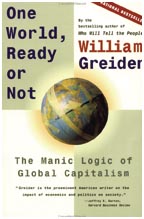April 7, 2004: Reading Room
William Greider ’58 argues that capitalism must be reformed by individuals and companies. (Linda F. Greider) |
An
end to greed
William Greider ’58 calls for a purification
of capitalism
By Louis Jacobson ’92
Journalist William Greider ’58 recently learned that his 1997 book, One World, Ready or Not: The Manic Logic of Global Capitalism, was required reading in a sociology and economics course at the University of Chicago, alongside volumes by Adam Smith and Max Weber. Greider doubts he’s worthy of such company, but he’s hoping his new book, The Soul of Capitalism: Opening Paths to a Moral Economy, will make at least as much of an impact as One World did.
The Soul of Capitalism, published by Simon & Schuster last fall, offers an alternative vision of capitalism — one in which Americans take a fuller stake in their economy. In this vision, employees own a share of their companies and take a role in management; mutual funds wield their power on behalf of their shareholders’ interests, rather than their own; and consumers flex their economic muscle to hold corporations to more enlightened business practices.
Greider, who writes for the left-of-center political weekly The Nation, says he seeks to purify capitalism from within by ending the perversions that are wrongly advanced under its banner.
The capitalist system, he argues, must be reformed not only by federal-government action but also by the scattered actions of individuals and companies willing to experiment with new business approaches. This strategy flummoxed some of his liberal friends, who have long looked primarily to the government to push economic and social change. “I think it’s crippling to have our stagnated, captured system of democracy be the only route to change,” Greider says from his office in Washington, D.C.
 |
In the book, Greider talks to dozens of Americans who are thinking, and acting, in unconventional ways. Some of his subjects run employee-owned companies; others operate investment funds that use socially conscious principles; while others lead consumer boycotts against environmentally questionable products.
Greider, who grew up near Cincinnati, got his start in journalism at the Daily Princetonian. At Princeton, he felt overwhelmed by the unfamiliar culture and the academic burden, which left him “always on the edge of being booted out of the place,” he says. His refuge was the Prince. Later stints as a reporter in Wheaton, Illinois, and Louisville, Kentucky, led to his hiring in 1968 by the Washington Post, where he became assistant managing editor; Rolling Stone in 1982; and The Nation in 1999.
Going against the tide isn’t new to Greider, whose 1987 book, Secrets of the Temple: How the Federal Reserve Runs the Country, challenged the conventional wisdom that the Fed should mercilessly fight inflation, and knocked the institution for acting with minimal democratic oversight.
Greider knows that Secrets of the Temple didn’t change
any minds inside the Fed, and he acknowledges similar obstacles to implementing
ideas from his latest book. Yet he says he’s optimistic that scattered
efforts to challenge the prevailing system are “bubbling up all
over the place.” ![]()
Louis Jacobson ’92 is a staff correspondent at National Journal magazine in Washington.
Book Shorts
 The Way Home
— ROBERT EARLE ’72 (DayBue). In this coming-of-age story,
the author deals with marriage and divorce, aging, and connections between
generations. The story follows Dan Kelly, a computer scientist in New
Mexico; his wife, Alicia, a teacher; and their teenage son, Max. But Earle
focuses on Max, who goes to boarding school in the Northeast after his
parents divorce. There he meets a few odd people at his nursing home job
while he struggles with the breakup of his family and his own independence.
Earle is a former diplomat.
The Way Home
— ROBERT EARLE ’72 (DayBue). In this coming-of-age story,
the author deals with marriage and divorce, aging, and connections between
generations. The story follows Dan Kelly, a computer scientist in New
Mexico; his wife, Alicia, a teacher; and their teenage son, Max. But Earle
focuses on Max, who goes to boarding school in the Northeast after his
parents divorce. There he meets a few odd people at his nursing home job
while he struggles with the breakup of his family and his own independence.
Earle is a former diplomat.
 Blackout
— JAMES GOODMAN *90 (North Point Press). On July 13, 1977, a major
blackout hit New York City. There was revelry and dancing, but also widespread
looting, vandalism, and arson. This book, a re-creation of the blackout
and its aftermath, explores what drove people to such acts. Goodman discusses
what caused the blackout and records conversations, such as one in an
elevator that stopped. Goodman is a professor of history at Rutgers University.
Blackout
— JAMES GOODMAN *90 (North Point Press). On July 13, 1977, a major
blackout hit New York City. There was revelry and dancing, but also widespread
looting, vandalism, and arson. This book, a re-creation of the blackout
and its aftermath, explores what drove people to such acts. Goodman discusses
what caused the blackout and records conversations, such as one in an
elevator that stopped. Goodman is a professor of history at Rutgers University.
 The Illustrated
Battle Cry of Freedom: The Civil War Era — JAMES M. MCPHERSON
(Oxford). An illustrated version of the Pulitzer Prize-winning author’s
account of the Civil War period, from the Mexican War to General Lee’s
surrender at Appomattox. This new edition contains 700 pictures, many
never before published, ranging from antique photographs to period cartoons
to full-color maps. McPherson is the George Henry Davis ’86 Professor
of History.
The Illustrated
Battle Cry of Freedom: The Civil War Era — JAMES M. MCPHERSON
(Oxford). An illustrated version of the Pulitzer Prize-winning author’s
account of the Civil War period, from the Mexican War to General Lee’s
surrender at Appomattox. This new edition contains 700 pictures, many
never before published, ranging from antique photographs to period cartoons
to full-color maps. McPherson is the George Henry Davis ’86 Professor
of History. ![]()
By Lucia S. Smith ’04

